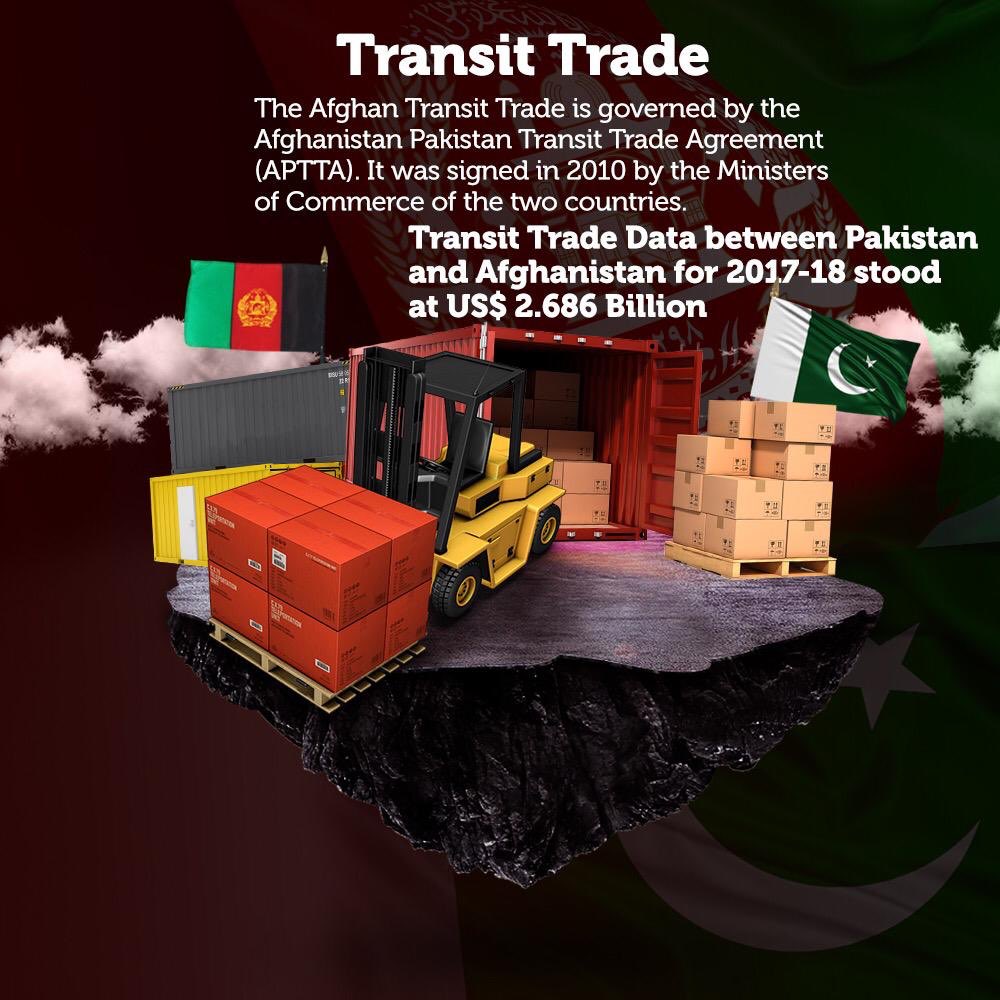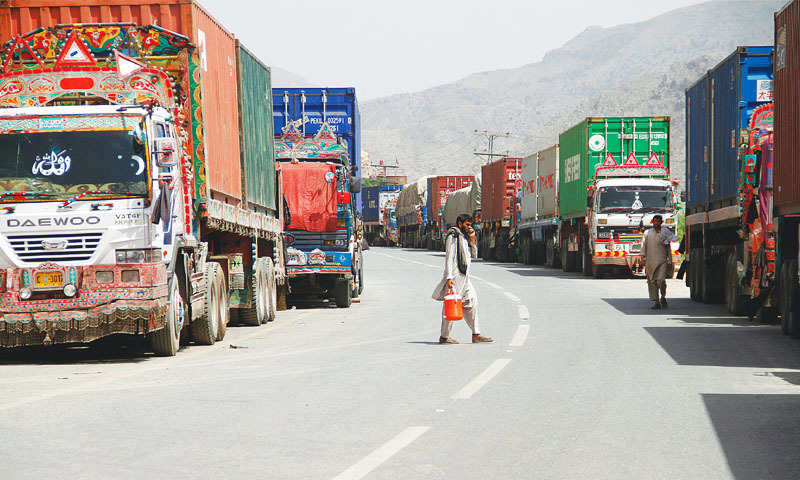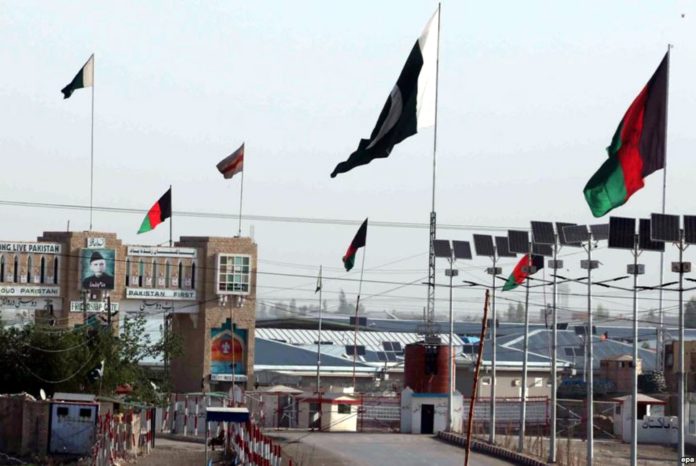Pakistan and Afghanistan are close neighbors with predominant Muslim population along with joint historic cultural linkages; however, relations between these two predominant Islamic countries were never pleasant since day one when British sub-continent was dived into two independent states, India and Pakistan. Analyzing demographically, southern and eastern Afghanistan is predominately Pashto-speaking, like the adjacent Khyber-Pakhtunkhwa, Federally Administered Tribal Areas, and northern Balochistan regions in Pakistan. This entire area is inhabited by the indigenous Pashtuns who belong to different Pashtun tribes. Relations between the two countries have been subject to various complexities over the decades by issues related to the Durand Line, the 1978 soviet invasion, present war resulted after 9/11, Afghan refugees, Taliban insurgency and border skirmishes including the growing relations of India and Afghanistan. However, the two countries are working to find solutions to these problems. This includes possible intelligence sharing as well as further enhancing the two-way trade and abolishment of visas for diplomats from the two nations. Let us first deal with the Durand Line issue.
The Durand Line border was established after the 1893 Durand Line Agreement between Mortimer Durand of colonial British India and Ameer Abd-ur-Rahman Khan of Afghanistan for fixing the limit of their respective spheres of influence. The single-page agreement, which contained seven short articles, was signed by Mr. Durand and Ameer Abd-ur-Rahman Khan, agreeing not to exercise political interference beyond the frontier line between Afghanistan and what was then the British Indian Empire. Shortly after the demarcation of the Durand Line, the British began connecting the region on its side of Durand line to the vast and expansive railway network. Concurrently, the Afridi tribesmen began to rise up in arms against the British, creating a zone of instability between Peshawar and the Durand Line. As a result, travel across the boundary was almost entirely halted. By the time of the sub continent independence movement, prominent Pashtun nationalists such as Abdul Ghaffar Khan advocated unity with the nearly formed Dominion of India, and not a united Afghanistan. By the time of Pakistan independence movement, popular opinion among Pashtuns was split amongst the majority who wished to join Pakistan.
Pakistan inherited the Durand Line agreement after its independence in 1947 but there has never been a formal agreement or ratification between Islamabad and Kabul. The Afghan government has not formally accepted the Durand Line as the international border between the two states, claiming that the Durand Line Agreement has been void in the past. This complicated issue is very sensitive to both the countries. The Afghan government worries that if it ever ratifies the agreement, it will permanently divide the 50 million Pashtuns and thus create a backlash in Afghanistan. Pakistan feels that the border issue had been resolved before its birth in 1947. This complicated border has always served as the main trade route between Afghanistan and the South Asia, especially for supplies into Afghanistan.
Shortly after Pakistan gained independence in 1947, Afghanistan crafted a two-fold strategy to destabilize the frontier regions of Pakistan, in an attempt to take advantage of Pakistan’s post-independence instability. It aligned itself with Pakistan’s rival, India, and also the USSR, which later invaded Afghanistan in 1979. Relations between Afghanistan and Pakistan began deteriorating in the 1970s after Pakistan supported rebels such as Gulbuddin Hekmatyar, Ahmad Shah Massoud, Haqqanis, and others against the governments of Afghanistan. In April 1978, Afghan President Daoud Khan was assassinated in Kabul during the Saur Revolution, this was followed in Pakistan by the execution of deposed Prime Minister Zulfikar Ali Bhutto in April 1979 and the assassination of Afghan President Nur Muhammad Taraki in September 1979. After the Soviet invasion of Afghanistan in December 1979, the United States joined Pakistan to counter Soviet influence with help from Pakistan’s premier intelligence agency ISI and advanced its own interests in the region. In turn, Afghan, Indian and Soviet intelligence agencies played their role by supporting al-Zulfikar – a Pakistani leftist group responsible for the March 1981 hijacking of a PIA plane.
During the 1980s, the Durand Line was heavily used by Afghan refugees fleeing the Soviet occupation in Afghanistan, including a large number of Mujahideen insurgent groups who crossed back and forth. The mujahideen included not only locals but also Arabs and others from over 40 different Islamic nations. Many of these foreign fighters married local women and decided to stay in Pakistan, among them were radical Muslims aligned to Egyptian Muslim Brotherhood.
After the Soviet withdrawal from Afghanistan in 1988 and the collapse of USSR, the country was engaged in internal civil war for a few years and witnessed power struggle between various Mujahideen groups. Pakistan’s embassy in Kabul also come under attack and was burned while the ambassador was badly injured as a result of Afghan groups attacking the embassy. Around September 1994, the Taliban movement captured the Afghan city of Kandahar and began its long conquest with help from Pakistan’s political support. The Taliban claimed that they wanted to clean Afghanistan of warlords and criminals. In late 1996, the Islamic Emirate of Afghanistan emerged and established close relations with neighboring Pakistan, however, relations began to decline when the Taliban refused to endorse the Durand Line despite pressure from Islamabad, arguing that there should be no borders among Muslims. When the Islamic Emirate of Afghanistan was toppled and the new Afghan government was formed, President Hamid Karzai began repeating the previous Taliban statement.

Afghanistan Pakistan Transit Trade Agreement (APTTA)
In July 2010, a Memorandum of Understanding (MoU) was reached between Pakistan and Afghanistan for the Afghan-Pak Transit Trade Agreement (APTTA), which was observed by U.S. Secretary of State Hillary Clinton. The two states also signed MoU for the construction of rail tracks in Afghanistan to connect with Pakistan Railways (PR), which has been in the making since at least 2005. In October 2010, the landmark APTTA agreement was signed by Pakistani Commerce Minister Makhdoom Amin Fahim and Anwar ul-Haq Ahady, Afghan Ministry of Commerce. The ceremony was attended by Richard Holbrooke, U.S. Special Representative for Afghanistan and Pakistan, and a number of foreign ambassadors, Afghan parliamentarians and senior officials. The APTTA allows Afghan trucks to drive inside Pakistan to the Wagah border with India, including to the port cities of Karachi and Gwadar. In November 2010, the two states formed a joint chamber of commerce to expand trade relations and solve the problems traders faced. In July 2012, Afghanistan and Pakistan agreed to extend APTTA to Tajikistan in what would be the first step for the establishment of a North-South trade corridor. The proposed agreement would provide facilities to Tajikistan to use Pakistan’s Gwadar and Karachi ports for its imports and exports while Pakistan would enjoy trade with Tajikistan under terms similar to the transit arrangement with Afghanistan. Having despite all efforts at betterment of relations between two countries, there are more serious problems as far as long term national objectives are concerned.
Handling Indian Ambitions in Afghanistan and Central Asia
The Indian role in Afghanistan is quite disturbing for Pakistan’s interests. The Indians have set up Consulates in major cities in Afghanistan along with intelligence network near Pakistani border. India has got major economic and defence related projects from current and previous Afghan governments and is involved in rebuilding and restructuring the entire network of highways throughout the country. The Government of Afghanistan is fully supporting Indians to set up their foot hold in the country so that Pakistan would never be able to attain strategic achievements. Moreover, Afghan northern alliance government officials mostly belong to Tajik and Uzbek ethnicities and they hold firm ties with these perspective neighboring governments. This link supported Indian ambitions to set up relations with Central Asian States of Tajikistan and Uzbekistan in every aspect especially economic and defence fields.
India has established military installations in both Tajikistan and Uzbekistan, this is a challenge for Pakistan in the longer and short term. If we analyze this situation while keeping in mind India’s Cold Start Doctrine, that is mainly focused for real war time situation, we might conclude a better scenario by joining these two pieces together that India’s advancement in the Central Asian region and establishing a foothold in Afghanistan and Central Asian States is basically part of their long term doctrine in Central Asia. We might also correlate somewhat Pakistan’s internal situation in some areas to Indian presence inside Afghanistan which is the result of RAW and Afghan agencies joint venture.
The threat from the east is very well managed by keeping a minimum level of deterrence, but India is using Afghanistan as a base camp to launch terror attacks in Pakistan. So it is diplomatically challenging how to neutralize Afghanistan. Below are some key areas Pakistan has to focus on for improving relations with Afghanistan.
Engagement with Central Asian States
It is very important for Pakistan to analyze the Afghan population racially and see how best to convert it into a friendly nation. Eastern Afghanistan consists mainly of Pashtuns who are well in line with our Pashtun population, but we need to pay more attention to other races living in Afghanistan like Tajeks, Uzbeks, Turkmans and Kyrghyzs. Their native nations Tajikistan, Turkmenistan, Uzbekistan should have some influence on these races so we must engage with these Central Asian States to get their support to neutralize 40% of the non-Pashtun Afghans. This is the huge diplomatic challenge we have to overcome. ECO bloc can play a key role in this regard as well as initiative taken by Moscow recently to help resolving the Afghan issue in which Pakistan and China are key players along with Russian and Iranian involvement. Pakistan must provide economical benefits to Central Asian States for gaining leverage and influence for strengthening the areas of economic zone. Our diplomats must be aggressive and pro-active to be able to gain influence over these land locked states. Afghanistan cannot be living in isolation if the Central Asian States engage strongly with Pakistan. This is an indirect pressure we can develop over the Kabul regime to behave and to monitor RAW/NDS activities against Pakistan.

Engagement through Infrastructure development Projects
Pakistan should encourage fellow Pakistani businessmen investing in Afghanistan by means of building highways and infrastructure to get further influence in order to keep Afghan people towards our side. This will help in reversing the negative image created by some lobbies about Pakistan. Afghanistan is a war torn country and needs infrastructure development, India acted quickly and gained advantage by investing huge amount of dollars to show their inclination and interest towards Afghanistan, although the real intention was always to curb Pakistan from western side.
Effective Management of Land Locked Status
Pakistan should effectively maneuver the land locked condition of Afghanistan for benefit to both countries and avoid further hostility. This is an important area and can be used as a carrot – stick policy. Examples are there when Pakistan stopped NATO supplies after the 2011 Bin Laden raid, thus leveraged this land locked status of Afghanistan for diplomatic maneuvering. Recently also Pakistan closed all borders with Afghanistan due to terrorists attacks, resultantly the law and order situation got better after the border closure. Consequently, the economy of Afghanistan went through a tough period during this border closure resulting in prices of utilities peaking leaving a marked impression on Afghan society that Pakistan is vital for Afghanistan’s prosperity and matters concerning day to day Afghan life. Pakistan’s currency Rupee is a powerful tool and is being utilized widely inside Afghanistan. This is again an area to try and enhance the zone of influence inside Afghanistan. Keep in mind that the Indian currency is not being utilized at all the way Pakistani currency is being used in day to day Afghan business transactions.
Engagement for Image building
Afghanistan did not accept Pakistan since its creation and always kept itself involved with states that were traditionally hostile to Pakistan. Moreover, Pakistan is being treated as a hostile nation in Afghan syllabus taught in schools, colleges and even universities. This is one of the main reasons of hostility and must be dealt with aggressive engagement with the Kabul regime. As an example, Turkey is the key ally of Pakistan and its people have great love and respect for Pakistan, reason being the Turkish literature tells its people how people from western sub continent (now Pakistan) had suffered fighting with British government in favor of the Ottoman Caliphate. The same thing is with China where there is a saying from Prophet Muhammad (PBUH) that travel to China for seek of knowledge. Also Pakistan’s philosopher poet Mohammad Iqbal mentioned China as a rising sun from east that must be followed. These historic sayings and events leave long term marks amongst nation’s relationships with each other. Pakistan has to work with Afghans on how to change this hostile image and try to change the minds of academics and intellectuals. This is a diplomatic task and has to be handled tactfully and carefully but aggressively.
Engagement through Parliamentary delegations
Afghanistan and Pakistan must engage through Parliamentary delegation interactions. All high level issues like Durand Line border status, visa issues, refugee issues and future relation building must be addressed with a strict timeline and deliverables. We have observed that some interaction took place recently between two parliaments and dialogue is in progress as well, but it must be time and result oriented. Indian RAW and NDS alliance against Pakistan can be discussed in this forum as well in order to create realization amongst parliamentarians to do something about it.
Effective border management and fencing
An effective border management was necessary in order to control and regulate law and order situation in Pakistan since it was established that main TTP and JUA terrorists entered Pakistan from the free Afghan border crossings. Good steps have been taken by Pakistan like building gates on the border to regulate visa entries, there is also planning for building wall/ fence across the western border. This is very important and will create an image and sense of realization amongst Afghans that Pakistan is tough like any other country to enter without proper visa.
Moreover, Pakistan should look into pockets of people amongst Afghan refugees who are friendly towards Pakistan, since two generations were born in Pakistan from 1980 till today. This can be a source of strength rather than a burden or weakness, all we need is to is identify those pockets of people. Our intelligence agencies must have enough information who is trustable and who is not so this shouldn’t be too difficult. Moreover, offer education visas to capable Afghan students and reward Afghan intellectuals who want peace between two countries and use media strength to elaborate it. This will create sense of trust between two nations. There should be many in Afghan political system who may want strong links with Pakistan rather than with India. We must leverage those favorable groups of Afghan society on all fronts with care and utmost attention. I am pretty optimistic if above mentioned steps are given due consideration, things might change and the table may start reversing slowly.
With ECO block strengthening and SCO block emerging, the political, strategic as well as economic paradigm will change in near future that will compel Afghan governments to tie up with Pakistan through CPEC in order to achieve mutual goal of regional prosperity.




